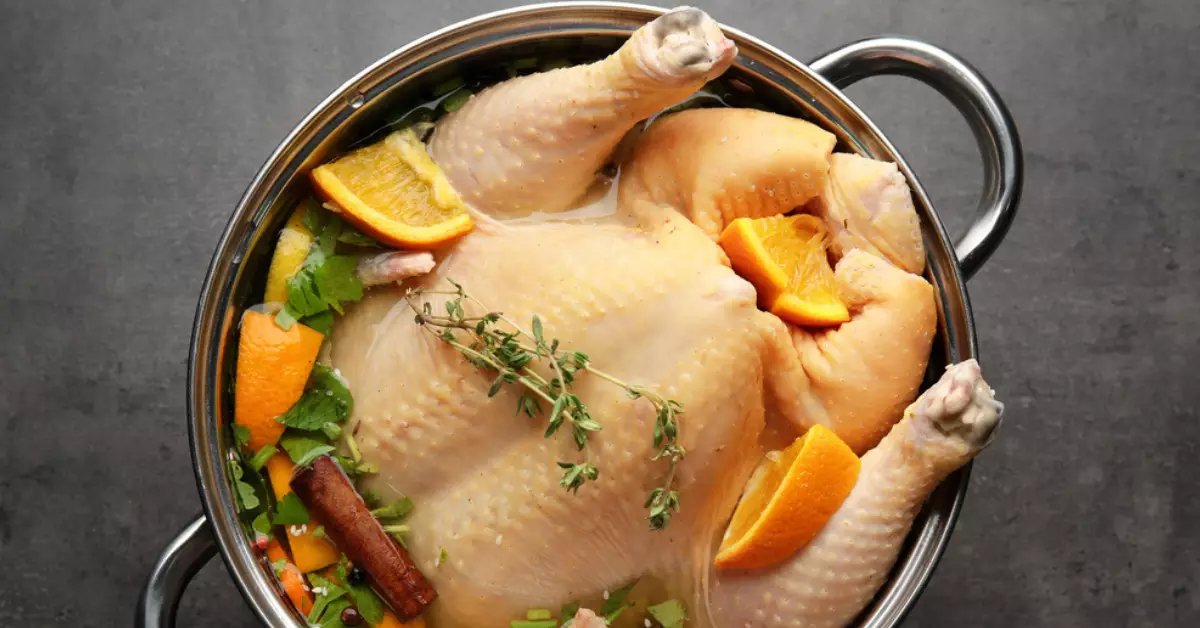Brining is a popular culinary process, particularly favored for flavoring and tenderizing poultry like turkey. It involves immersing the bird in a solution of water, salt, and often other seasonings, effectively marinating it before the cooking process begins. This method greatly enhances the taste and texture of the turkey, keeping it juicy and flavorful even after hours of roasting.
A quick answer to the question if you can reuse turkey brine would be a cautious “Yes, but…”. While technically possible, the practice of reusing brine comes with a set of safety concerns and limitations. Food safety should always be paramount when preparing meals, and reused brine can potentially harbor harmful bacteria.
Turkey brining has the power to transform a standard holiday meal into a memorable gourmet experience. However, understanding the factors that influence the effectiveness and safety of the brining process, including the reuse of brine, is crucial for any home cook or professional chef.
Concept of Reusing Brine
Defining Brine Reuse
Reusing brine refers to the practice of employing the same brine solution more than once, either for the same type of meat or different ones. Some cooks consider this method to maximize the utility of brine, especially when it contains a variety of costly or labor-intensive ingredients.
Reasons to Consider Brine Reuse
The main reasons to contemplate reusing brine include reducing waste and saving on preparation time and resources. However, the potential benefits need to be carefully weighed against the possible health risks and compromised flavor quality.
Is It Safe to Reuse Turkey Brine?
The matter of food safety cannot be overstated, especially in a context where brine, used to marinate raw poultry, is being considered for reuse. In most professional and home kitchens, the standard practice is to discard brine once it has been used, and for good reason.
The danger of reusing brine lies primarily in the potential for bacterial growth. When you brine turkey, the raw meat releases juices into the brine which can contain harmful bacteria such as Salmonella or Campylobacter.
Even when refrigerated, these bacteria can multiply rapidly under certain conditions. Reusing this contaminated brine for another turkey or different type of meat can lead to cross-contamination, increasing the risk of foodborne illnesses.
Risks Associated with Reused Brine
Beyond the concern for food safety, there are other risks associated with reusing brine. Even if the brine is properly handled to minimize bacterial growth, reusing it can compromise the taste and quality of the finished product.
Diluted Flavor
Each time brine is used, it loses some of its potency. A fresh brine solution has a concentrated blend of salt and seasonings that permeates the turkey, enhancing its natural flavor. Reused brine, having already expended some of its flavor components on the first turkey, may not have the same flavor intensity or ability to effectively brine a second turkey.
Variable Salinity
The salt content or salinity of the brine is a critical factor in the brining process. The osmotic process that allows the brine to tenderize the meat and enhance its flavor depends on the salinity of the brine. A reused brine may not have a consistent salt content, thus affecting the osmosis process and the overall result.
Ingredient Saturation
Brine often includes other ingredients such as sugar, herbs, and spices, all contributing to the flavor profile. These ingredients become less effective over time as they become saturated, resulting in a less flavorful second turkey.
Exploring the Feasibility of Brine Reuse
While generally not recommended, there could be circumstances where brine reuse might be considered. However, these are usually exceptional situations where the careful handling and treatment of the brine can mitigate the risks.
Possible Scenarios for Brine Reuse
There are a few scenarios where brine reuse might be considered safe and feasible.
- Same-Day Use: If you plan on brining and cooking two turkeys on the same day, for instance, for a large gathering, you might consider reusing the brine. This assumes that the brine is kept at a safe temperature to minimize bacterial growth, and it is not left out for prolonged periods.
- Immediate Sequential Use: If you need to brine two smaller turkeys one after the other due to space limitations in your refrigerator, reusing the brine might be a plausible solution.
Precautions When Reusing Brine
In any scenario where you decide to reuse brine, it’s essential to adhere strictly to food safety guidelines.
- Temperature Control: Always keep the brine refrigerated when not in use. Bacteria multiply rapidly at room temperature. Never reuse brine that has been left out at room temperature for more than two hours.
- Time Limitation: Do not store and reuse brine for extended periods. The longer the brine is stored, the more opportunity there is for bacteria to grow.
- Boiling and Cooling: Before reusing brine, boil it to kill any bacteria present, and then cool it thoroughly before adding the second turkey. Never place a turkey in hot brine as this can start cooking the bird prematurely.
- Brine Strength Check: Check the salt concentration in the reused brine. You might need to add more salt to ensure it is sufficient for effective brining.
Alternative Approaches to Brine Reuse
Given the risks associated with reusing brine, it may be safer and more beneficial to find alternative uses for your brine or to maximize its use without direct reuse.
Repurposing Used Brine
Rather than reusing brine for another turkey, you might consider other ways to repurpose it, provided it is properly handled to ensure safety.
- Sauces or Gravy: Used turkey brine can be boiled, reduced, and used as a base for flavorful sauces or gravy.
- Soup Broths: The brine can also be added to soups or stews, lending a unique flavor to the broth.
- Pickling Vegetables: Used brine, when boiled and cooled, can be used for pickling vegetables.
In each of these cases, it’s important to remember to boil the used brine to kill any potential bacteria before using it in these ways.
Making the Most of Your Brine
If you regularly brine turkeys and are looking to save time and resources, consider these tips to make the most of your brine without reusing it.
- Large Batch Brine: Prepare a large batch of brine and freeze it in smaller portions. This allows you to always have fresh, potent brine on hand when you need it without the risks associated with reusing brine.
- Brine Concentrate: Another approach is to make a brine concentrate. This involves using less water during the preparation of the brine, resulting in a concentrated solution. This concentrate can be stored for longer periods and diluted with water when needed. This way, you get more uses out of your brine without the need for reuse.
Tips for Safe and Effective Brining
Selecting Quality Brine Ingredients
The ingredients used in your brine can greatly influence the final result. Always opt for fresh, high-quality spices, herbs, and salts for the best outcome.
Proper Brining Techniques
Understanding the basics of effective brining is vital. This includes the correct brine-to-turkey ratio, adequate brining time, and appropriate brining temperature.
Frequently Asked Questions
Can you reuse brine for different types of meat?
It’s not recommended to reuse brine for different types of meat due to the risk of cross-contamination and the potential for uneven flavor transfer.
How long can you keep turkey brine in the fridge?
Unused turkey brine can be refrigerated for up to two weeks. If it has been used to brine a turkey, it should be discarded immediately after use to prevent bacterial growth.
Can you freeze turkey brine for future use?
Yes, fresh turkey brine can be frozen for up to six months. Remember to leave some space in the container for the brine to expand as it freezes.
Conclusion
While the idea of reusing turkey brine might seem appealing, it’s essential to consider the associated health risks and potential decline in flavor quality. For most home cooks and professional chefs, the safety and quality concerns outweigh the potential benefits of brine reuse.
There are alternatives for getting the most out of your brine without reusing it directly with another turkey. These include repurposing used brine or freezing fresh brine for future use. These options help to reduce waste and maximize the culinary potential of your brine.
In conclusion, while brining is an excellent way to ensure a moist and flavorful turkey, reusing the brine is a practice best approached with caution. Remember, a delicious turkey starts with careful preparation and a commitment to food safety.







